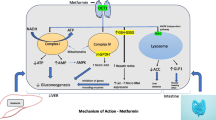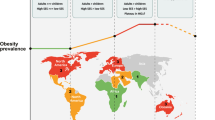Abstract
Obesity is a growing epidemic in the USA with over one third of adults presently classified as obese. Obesity-related comorbidities include many leading causes of preventable death such as heart disease, stroke, type 2 diabetes, and certain types of cancer. Modest weight loss of 5–10 % of body weight is sufficient to produce clinically relevant improvements in cardiovascular disease risk factors among patients with overweight and obesity. Until recently, there were limited pharmacologic options approved by the Food and Drug Administration to treat obesity. Phentermine/topiramate ER and lorcaserin were approved in 2012, and naltrexone SR/bupropion SR and liraglutide 3.0 mg were approved in 2014. This article reviews recent literature in the field of Obesity Medicine and highlights important findings from clinical trials. Future directions in the pharmacologic management of obesity are presented along with new diabetes medications that promote weight loss and reduce cardiovascular mortality.
Similar content being viewed by others
References
Papers of particular interest, published recently, have been highlighted as: • Of importance •• Of major importance
Ogden CL, Carroll MD, Fryar CD, Flegal KM. Prevalence of obesity among adults and youth: united states, 2011–2014. NCHS Data Brief. 2015;219:1–8.
Ogden CL, Flegal KM. Changes in terminology for childhood overweight and obesity. Natl Health Stat Report. 2010;25:1–5.
Finkelstein EA, Trogdon JG, Cohen JW, Dietz W. Annual medical spending attributable to obesity: payer-and service-specific estimates. Health Aff (Millwood). 2009;28(5):w822–31.
Trogdon JG, Finkelstein EA, Hylands T, Dellea PS, Kamal-Bahl SJ. Indirect costs of obesity: a review of the current literature. Obes Rev. 2008;9(5):489–500.
Thompson D, Edelsberg J, Kinsey KL, Oster G. Estimated economic costs of obesity to U.S. business. Am J Health Promot. 1998;13:120–7.
Wolf AM, Colditz GA. The cost of obesity: the US perspective. Pharmacoeconomics. 1994;5:34–7.
Lovren F, Teoh H, Verma S. Obesity and atherosclerosis: mechanistic insights. Can J Cardiol. 2015;31(2):177–83.
Magkos F, Fraterrigo G, Yoshino J. Effects of moderate and subsequent progressive weight loss on metabolic function and adipose tissue biology in humans with obesity. Cell Metab. 2016;S1550-4131(16):30053–5.
Wing RR, Lang W, Wadden TA, et al. Benefits of modest weight loss in improving cardiovascular risk factors in overweight and obese individuals with type 2 diabetes. Diabetes Care. 2011;34(7):1481–6.
The Look AHEAD Research Group. The look AHEAD study: A description of the lifestyle intervention and the evidence supporting it. Obesity. 2006;14:737–52.
Diabetes Prevention Program (DPP) Research Group. The diabetes prevention program (DPP): description of lifestyle intervention. Diabetes Care. 2002;25:2165–71.
Hinkle W, Cordell M, Leibel R, Rosenbaum M, Hirsch J. Effects of reduced weight maintenance and leptin repletion on functional connectivity of the hypothalamus in obese humans. PLoS One. 2013;8(3):e59114.
Rosenbaum M, Goldsmith R, Bloomfield D. Low-dose leptin reverses skeletal muscle, autonomic, and neuroendocrine adaptations to maintenance of reduced weight. J Clin Invest. 2005;115(12):3579–86.
Rosenbaum M, Hirsch J, Gallagher DA, Leibel RL. Long-term persistence of adaptive thermogenesis in subjects who have maintained a reduced body weight. Am J Clin Nutr. 2008;88(4):906–12.
Jensen MD, Ryan DH, Apovian CM, et al. 2013 AHA/ACC/TOS guideline for the management of overweight and obesity in adults: a report of the American College of Cardiology/American Heart Association Task Force on Practice Guidelines and The Obesity Society. J Am Coll Cardiol. 2014;63((25 Pt B)):2985–3023. This publication denotes the first clinical practice guidelines for the management of adults with overweight and obesity. These guidelines were drafted by a task force of experts from the American College of Cardiology, American Heart Association and The Obesity Society.
Apovian CM, Aronne LJ, Bessesen DH, et al. Pharmacological management of obesity: an endocrine Society clinical practice guideline. J Clin Endocrinol Metab. 2015;100(2):342–62. This publication denotes the first clinical practice guidelines for the pharmacologic management of obesity. These guidelines were drafted by an Endocrine Society-appointed task force of experts, and were co-sponsored by the European Society of Endocrinology and The Obesity Society.
American Medical Association. Policy H-440.842. Recognition of Obesity as a Disease. 2013.
Allison DB, Gadde KM, Garvey WT, et al. Controlled-release phentermine/topiramate in severely obese adults: a randomized controlled trial (EQUIP). Obesity (Silver Spring). 2012;20(2):330–42.
Gadde KM, Allison DB, Ryan DH, et al. Effects of low-dose, controlled-release, phentermine plus topiramate combination on weight and associated comorbidities in overweight and obese adults (CONQUER): a randomised, placebo-controlled, phase 3 trial. Lancet. 2011;377(9774):1341–52.
Garvey WT, Ryan DH, Look M, et al. Two-year sustained weight loss and metabolic benefits with controlled-release phentermine/topiramate in obese and overweight adults (SEQUEL): a randomized, placebo-controlled, phase 3 extension study. Am J Clin Nutr. 2012;95(2):297–308.
Smith SR, Weissman NJ, Anderson CM, et al. Multicenter, placebo-controlled trial of lorcaserin for weight management. N Engl J Med. 2010;363(3):245–56.
Fidler MC, Sanchez M, Raether B, et al. A one-year randomized trial of lorcaserin for weight loss in obese and overweight adults: the BLOSSOM trial. J Clin Endocrinol Metab. 2011;96(10):3067–77.
O’Neil PM, Smith SR, Weissman NJ, et al. Randomized placebo-controlled clinical trial of lorcaserin for weight loss in type 2 diabetes mellitus: the BLOOM-DM study. Obesity (Silver Spring). 2012;20(7):1426–36.
Greenway FL, Fujioka K, Plodkowski RA, et al. Effect of naltrexone plus bupropion on weight loss in overweight and obese adults (COR-I): a multicentre, randomised, double-blind, placebo-controlled, phase 3 trial. Lancet. 2010;376(9741):595–605.
Apovian CM, Aronne L, Rubino D, et al. A randomized, phase 3 trial of naltrexone SR/bupropion SR on weight and obesity-related risk factors (COR-II). Obesity (Silver Spring). 2013;21(5):935–43.
Wadden TA, Foreyt JP, Foster GD, et al. Weight loss with naltrexone SR/bupropion SR combination therapy as an adjunct to behavior modification: the COR-BMOD trial. Obesity (Silver Spring). 2011;19(1):110–20.
Hollander P, Gupta AK, Plodkowski R, et al. Effects of naltrexone sustained-release/bupropion sustained-release combination therapy on body weight and glycemic parameters in overweight and obese patients with type 2 diabetes. Diabetes Care. 2013;36(12):4022–9.
Pi-Sunyer X, Astrup A, Fujioka K, et al. A randomized, controlled trial of 3.0 mg of liraglutide in weight management. N Engl J Med. 2015;373(1):11–22.
Davies MJ, Bergenstal R, Bode B, et al. Efficacy of Liraglutide for weight loss among patients with type 2 diabetes: the SCALE Diabetes randomized clinical trial. JAMA. 2015;314(7):687–99.
Wadden TA, Hollander P, Klein S, et al. Weight maintenance and additional weight loss with liraglutide after low-calorie-diet-induced weight loss: the SCALE Maintenance randomized study. Int J Obes (Lond). 2013;37(11):1443–51.
Thomas EA, Mcnair B, Bechtell JL, Ferland A, Cornier MA, Eckel RH. Greater hunger and less restraint predict weight loss success with phentermine treatment. Obesity (Silver Spring). 2016;24(1):37–43.
Connolly HM, Crary JL, McGoon MD, et al. Valvular heart disease associated with fenfluramine-phentermine. N Engl J Med. 1997;337(9):581–8.
Wadden TA, Berkowitz RI, Womble LG, et al. Randomized trial of lifestyle modification and pharmacotherapy for obesity. N Engl J Med. 2005;353(20):2111–20.
Digenio AG, Mancuso JP, Gerber RA, Dvorak RV. Comparison of methods for delivering a lifestyle modification program for obese patients: a randomized trial. Ann Intern Med. 2009;150(4):255–62.
Nauck M, Frid A, Hermansen K, et al. Efficacy and safety comparison of liraglutide, glimepiride, and placebo, all in combination with metformin, in type 2 diabetes: the LEAD (liraglutide effect and action in diabetes)-2 study. Diabetes Care. 2009;32(1):84–90.
Hughes TE, Kim DD, Marjason J, Proietto J, Whitehead JP, Vath JE. Ascending dose-controlled trial of beloranib, a novel obesity treatment for safety, tolerability, and weight loss in obese women. Obesity (Silver Spring). 2013;21(9):1782–8.
Kim DD, Krishnarajah J, Lillioja S, et al. Efficacy and safety of beloranib for weight loss in obese adults: a randomized controlled trial. Diabetes Obes Metab. 2015;17(6):566–72.
Zafgen Inc. Zafgen’s pivotal phase 3 trial of beloranib in Prader-Willi syndrome achieves co-primary efficacy endpoints. http://ir.zafgen.com/releasedetail.cfm?ReleaseID=950876. Accessed February 26, 2016.
Zafgen Inc. Zafgen announces positive results from phase 2 clinical trial of beloranib in hypothalamic injury associated obesity. http://ir.zafgen.com/releasedetail.cfm?releaseid=889999. Accessed March 8, 2016.
Zafgen, Inc. Zafgen provides clinical update on Beloranib. http://ir.zafgen.com/releasedetail.cfm?releaseid=945102. Accessed February 26, 2016.
Lomaira KVK Tech, Inc. http://kvktech.com/lomaira/ Accessed Feburary 27, 2016.
Smith SR, Garvey WT, Greenway F, et al. Combination Weight Management (WM) Pharmacotherapy with Lorcaserin (LOR) and Immediate Release (IR) Phentermine (phen) [abstract]. Poster presented at Obesity Week. Boston; 2014.
Aronne LJ. A practical guide to drug-induced weight gain. Minneapolis: McGraw-Hill; 2002.
Top-Line Data Show CV Benefit for Liraglutide in Type 2 Diabetes. Miriam E Tucker. Medscape Medical News. WebMD LLC. http://www.medscape.com/viewarticle/859905. Accessed March 8, 2016.
Zinman B, Wanner C, Lachin JM, et al. Empagliflozin, cardiovascular outcomes, and mortality in type 2 diabetes. N Engl J Med. 2015;373(22):2117–28. EMPA-REG OUTCOME is the first trial investigating a medication for type 2 diabetes which demonstrates both weight loss and improved cardiovascular outcomes in high-risk patients.
Dungan KM, Povedano ST, Forst T, et al. Once-weekly dulaglutide versus once-daily liraglutide in metformin-treated patients with type 2 diabetes (AWARD-6): a randomised, open-label, phase 3, non-inferiority trial. Lancet. 2014;384(9951):1349–57.
Vasilakou D, Karagiannis T, Athanasiadou E, et al. Sodium-glucose cotransporter 2 inhibitors for type 2 diabetes: a systematic review and meta-analysis. Ann Intern Med. 2013;159:262–74.
Stenlöf K, Cefalu WT, Kim KA, et al. Efficacy and safety of canagliflozin monotherapy in subjects with type 2 diabetes mellitus inadequately controlled with diet and exercise. Diabetes Obes Metab. 2013;15:372–82.
Inzucchi SE, Bergenstal RM, Buse JB, et al. Management of hyperglycemia in type 2 diabetes, 2015: a patient-centered approach: update to a position statement of the American Diabetes Association and the European Association for the Study of Diabetes. Diabetes Care. 2015;38(1):140–9.
Author information
Authors and Affiliations
Corresponding author
Ethics declarations
Conflict of Interest
Katherine H. Saunders and Leon I. Igel declare that they have no conflict of interest.
Rekha B. Kumar declares personal fees for being a speaker for Jansen Pharmaceuticals and is a shareholder in Zafgen and Myos Corporation.
Louis J. Aronne declares consultant/advisory board work with Jamieson Labs, Pfizer Inc, Novo Nordisk A/S, Eisai, VIVUS, GI Dynamics, JOVIA Health, and Gelesis. He is a shareholder of Zafgen, Gelesis, Myos Corporation, and Jamieson Labs, and he is on the Board of Directors of MYOS Corporation and Jamieson Labs. He has received research funding from Aspire Bariatrics and Eisai.
Human and Animal Rights and Informed Consent
All studies by Louis J. Aronne involving animal and/or human subjects were performed after approval by the appropriate institutional review boards. When required, written, informed consent was obtained from all participants.
Additional information
This article is part of the Topical Collection on Clinical Trials and Their Interpretations
Rights and permissions
About this article
Cite this article
Saunders, K.H., Kumar, R.B., Igel, L.I. et al. Pharmacologic Approaches to Weight Management: Recent Gains and Shortfalls in Combating Obesity. Curr Atheroscler Rep 18, 36 (2016). https://doi.org/10.1007/s11883-016-0589-y
Published:
DOI: https://doi.org/10.1007/s11883-016-0589-y




